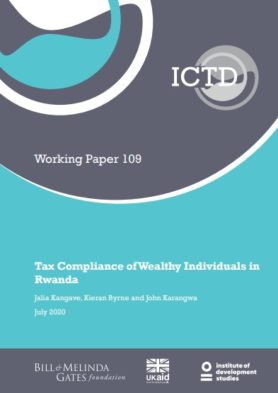Working Paper 109
Low-income countries are increasing their fiscal independence through the improvement of domestic taxation systems. To continue to do so, they must ensure that these systems are perceived as equitable and preserve their integrity. An essential characteristic of an equitable tax system is the treatment of wealthy individuals. In this paper, we use key informant interviews and data from key government institutions, including the Rwanda Revenue Authority (RRA), the land agency and the body in charge of development investment, to get some insight into individual wealth in Rwanda and the tax compliance of wealthy individuals. We find low levels of compliance among identified individuals, which could be partly explained by the fact that the existing law does not require certain categories of individuals to file tax returns. In addition, there is some evidence to suggest that some rich individuals engage in tax evasion.
